东西方数字九的文化对比分析与翻译外国语论文
浅谈英汉数字的文化差异与翻译

浅谈英汉数字的文化差异与翻译内容摘要世界上任何一种语言都是植根于特定的文化背景之中,反映着特定的文化内容。
语言中数字是反映客观物质世界的规模、大小的数和量,而由于各自语言中所包涵的文化传统、思维观念、以及对数字的感知取向不同,故而赋予数字的社会文化涵义也不尽相同。
本文主要针对中西方对数字不同的传统观念、英汉语言中数字包含的内涵意义以及在英汉文学及生活中碰到的有关数字的翻译等,来探讨英汉数字文化的差异,为跨文化交际提供便利。
关键词:英汉数字;内涵意义;翻译;实指义;虚指义;词汇空缺The Cultural Differences and Translation of Figure between English and ChineseAbstractEvery language in the world takes root in a special cultural background, and the language reflects the contents of the culture. Figure is the count and quantity which reflects the scope and size of the objective world. The social meanings of figure are different because there are some differences in cultural tradition, the concept of thinking and the understanding and using of the figure among all kinds of languages. This paper is to discuss the differences between English and Chinese figure from the traditional conception, the meanings of the figure and the translation with figure between the two languages. The aim from which is expected to make an advantage in cross-cultural communication.Key words: figure in English and Chinese; implied meaning; translation; grammatical meaning; false meaning; vocabulary vacancy“语言与文化有着密切的关系。
毕业论文 中英数字的文化对比研究及翻译

摘要:数字不仅反映了人们对现实事物的数量关系的计算和测量,更为重要的是,数字还在不同文化中扮演着多重角色。
本文从英汉两种语言文化中人们对数字的喜好不同入手,概括总结出含数字的习语的翻译方法。
关键词:毕业论文网 中英数字文化对比研究翻译方法1.引言由于受中西方文化传统、宗教信仰、语言崇拜、地理环境等方面的影响,数字的神化存在着中西方的差异,但也存在着共同的规律。
中西方人都有自己心目中的“天数”或“神数”。
因此,对比梳理中西方文化对数字的理解和认识对于跨文化交际和数字翻译问题极具现实意义。
2.汉英数字的对比研究由于英汉文化的共通性和思维方式的相似性,人们会对同一数字产生相同或相似的联想:但是由于英汉民族在自然环境、社会制度、风俗习惯、宗教信仰及思维方式等方面又存在着差异,形成了各具特色的民族文化。
文化的差异,导致人们赋予同一数字不同的情感和联想,而不同的数字可能产生相同或相似的联想。
2.1同一数字在中英文化中含义相同一、三、八在中英文化中具有相同或者相似的含义。
汉语中,数字“一”是万物的本源,具有本体性的意义。
因此,“一”自古受到尊崇;“一”代表至高无上,这是西方哲学对数字“一”的认识,此外,“一”在中英语言中均有“第一”或“胜利者”的联想义。
由此可见,中西方文化赋予“一”的联想意义如出一辙。
《老子》的“三生万物”确立了数字“三”的重要地位,赋予了“三”的“终极”、生发、吉祥之义。
中国宗教中对三也有各自的思想,如佛教有佛、法、僧“三宝”;经、律、论“三藏”;水、火、风“三灾”;天堂、地狱、人间“三界”;前生、今生、来生“三生”等概念。
可见,“三”在中国文化中具有十分吉祥、神圣、圆满的联想意义。
在西方文化中,“三”通常表示吉祥、完整的意义。
基督教把圣父、圣子、圣灵称为“三位一体”;毕达哥拉斯认为“三”是唯一有头、有尾、有腹的完美数字。
“八”是中国人民喜爱的数字,它象征着周到、圆满。
“八”和“发”谐音,所以就更得到想发财的人的青睐,人们喜欢自己的房间、门牌、车牌和电话号码等都含有“八”。
中西方数字文化差异英语作文
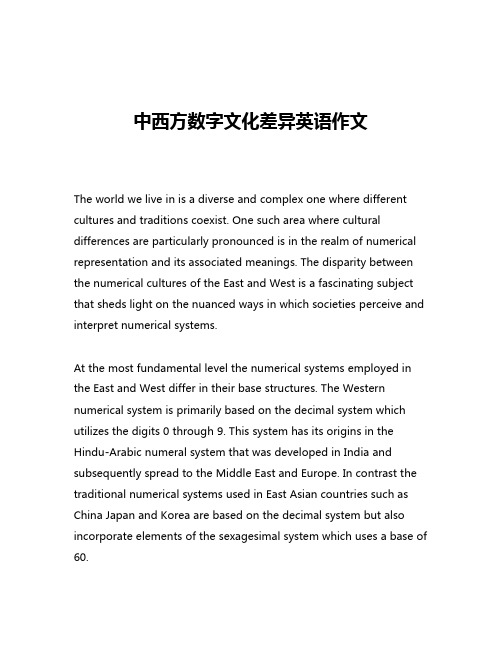
中西方数字文化差异英语作文The world we live in is a diverse and complex one where different cultures and traditions coexist. One such area where cultural differences are particularly pronounced is in the realm of numerical representation and its associated meanings. The disparity between the numerical cultures of the East and West is a fascinating subject that sheds light on the nuanced ways in which societies perceive and interpret numerical systems.At the most fundamental level the numerical systems employed in the East and West differ in their base structures. The Western numerical system is primarily based on the decimal system which utilizes the digits 0 through 9. This system has its origins in the Hindu-Arabic numeral system that was developed in India and subsequently spread to the Middle East and Europe. In contrast the traditional numerical systems used in East Asian countries such as China Japan and Korea are based on the decimal system but also incorporate elements of the sexagesimal system which uses a base of 60.This difference in base structures has led to some interesting divergences in the way numbers are conceptualized and expressed. For instance in the Chinese language individual digits are assigned unique names rather than simply being referred to by their numerical value. The number 4 for example is known as "si" while 7 is "qi". This stands in contrast to the more straightforward numerical naming conventions used in Western languages. Additionally Chinese numerals are written using logographic characters rather than the alphabetic digits employed in the West further emphasizing the distinct visual representation of numbers.The cultural significance assigned to certain numbers also varies greatly between Eastern and Western societies. In the West the number 13 is often viewed with superstition and considered to be unlucky. This belief is so pervasive that many buildings omit a 13th floor and airports lack a Gate 13. In contrast in China the number 4 is widely regarded as unlucky due to its phonetic similarity to the word for "death" in Mandarin. As a result Chinese buildings and product packaging frequently skip the fourth floor or fourth item in a series.Numerical symbolism also manifests in more subtle ways. In Western countries even numbers are often perceived as more balanced and harmonious while odd numbers are seen as less stable. This preference for even numbers can be observed in the layout of buildings the design of consumer products and the organization ofevents. Conversely in East Asian cultures odd numbers are frequently associated with masculinity and vitality while even numbers symbolize femininity and passivity.These divergent attitudes towards numbers extend to their practical applications as well. In the business world for instance Chinese negotiators may place a higher premium on auspicious numbers when making deals. The number 8 for example is considered extremely lucky in China due to its phonetic similarity to the word for "prosperity". As a result Chinese companies may deliberately choose addresses or phone numbers containing multiple 8s. Western business practices on the other hand tend to be more pragmatic and numbers-driven with less emphasis on symbolic significance.Differences in numerical culture can also be seen in the realm of personal names. In the West names are often chosen for their meaning sound or connection to family heritage. Numerical considerations play a relatively minor role. However in China and other East Asian societies the selection of names with favorable numeric associations is extremely important. Parents will carefully choose characters for their children's names that incorporate lucky numbers or avoid unlucky ones. The goal is to endow the individual with positive numeric energy that will bring good fortune and success throughout their life.Ultimately the divergent attitudes towards numbers between Eastern and Western societies stem from deep-rooted cultural traditions and philosophical worldviews. The decimal-based numerical system used in the West reflects a linear and quantitative approach to mathematics and problem-solving. In contrast the incorporation of sexagesimal elements and symbolic number associations in East Asian numerical culture points to a more holistic and qualitative understanding of the role of numbers in the universe.These fundamental differences have profound implications not just for how numbers are perceived and utilized but for the broader mindsets and behaviors that characterize Eastern and Western societies. As the world becomes increasingly interconnected it is crucial to develop a nuanced appreciation for these cross-cultural numerical distinctions. Only then can we navigate the complexities of a globalized world with greater cultural sensitivity and mutual understanding.。
中西方数字的文化差异毕业论文

【标题】中西方数字的文化差异【作者】柯娟【关键词】数字;吉祥文化;禁忌文化;差异【指导老师】余烈全【专业】英语【正文】I. IntroductionCulture consists of material civilization and spirit civilization of the whole society. Chinese scholars, such as Hu Wenzhong and Jia Yuxin, have defined culture into two senses. In a broad sense, culture refers to all the material and spiritual products created by man. In a narrow sense, it refers only to spiritual products including language, literature, fine arts and so on. 1 Different people define “culture” from different angles. In fact, there are more than two hundred and fifty definitions. What has been termed the classic definition of culture was provided by the 19th century English anthropologist Edward Burnett Tyler declared that Culture is a complex whole, which included knowledge, belief, art, morals, law, customs, and other capabilities and habits acquired by man as a member of Cultural differences reflect that people in different environments possess differences of many aspects, such as language, knowledge, and religious faiths. Differences in culture, especially between China and English speaking countries, may lead to various understanding and explanation on the same thing or conception, even to reduce misunderstanding each other. Number is a combination of concept and mark, which is a conclusion that humankind observe object world and understand material world. 3 Number is used to mean the quantity or to assign the place of a series by order of number. 4 However, a special numerical culture exists in different language backgrounds and national cultures. Numbers clearly reflect the psychological bases, traditions and characteristics of culture because of the impact of cultural differences, such as national psychology, religious belief, language worship and aesthetic notion. Numbers have various mysterious taboo, lucky and symbolic meaning, and they show cultural characteristics of nations, even their own numeral culture. Meanwhile such numeral culture unavoidably influence people’s psycholo gy and behaviors. Number, as one kind of important culture language, is used frequently as thought and intercourse tool. Hence, this article is to discus the causes of cultural differences of numbers by analyzing on some representative numbers in both Chinese and English, to know the differences in order torespect each other mutually, reduce misunderstanding and do better cross-cultural communication.Ⅱ.The Causes of Cultural Differences of NumbersA. Symbolic Meaning Brought by Homophony and Partial Meaning of Numbers Homophony refers to two or more words with the same form but with different meaning. In Chinese language, there are a large number of homonyms. Homonyms are words with different meaning but either identical both in sound and spelling or identical only in spelling or sound. 5 So homophony is not only a linguistic phenomenon but also a cultural phenomenon. It is connected with the culture, national mentality and aesthetic customs. Among the homonymous phenomena, numbers are typical. It is the case that English and Chinese people live in an absolutely different natural environment and social cultural origins, Chinese people have strong psychology of symmetry, doubleness, association and analogy, pursuing goodness and avoiding badness. It is natural that people are fully aware of usage of homophony. Compared with other languages all over the world, Chinese language has a great number of cultures of homophony and partial meaning. For example, the number 8(八,ba) sounds like 发(fa)in Chinese, then 8 becomes a popular number nowadays. People hope that all the substance they owned can be related to number 8, such as phone number, house number, license number and so on. One more example, the number 5, is similar to 吾(I); of course, number 58 means 吾发(making fortune), the number 9,(久, long-lasting)means permanent, which is still a popular number. The reason why those numbers become lucky number is that their pronunciation is similar to commendatory words.At the same time, a few numbers are considered as taboo numbers because of bad homophony. Especially the number 4(four,四,si). It is avoided because it sounds like “die”(死,si) and it is the most worst number in the public minds. As a result, some people go so far as to call the fourth floor of a building 3A because the pronunciation of the “fourth floor”(四楼,si lou) is identical with 死楼. As a mater of fact, a few of nations in western countries show great respect for number 4, which stands for fair, justice and power.In contrast, the number “eight”(8) is an ordinary and lucky number in both English and Chinese cultures, not its homophony but its structure. It gives us a meaning imagination. People consider that the number 8 is combined by double 0(zero), which is not only a sign of special meaning, but also a stable and harmonious sign.B. The Close Association with Mythology and ReligionMythology is a body of myth, especially those relating to a people’s gods and heroes and to their origins or those connected with certain subject.6 Myths connect with numbers in both Chinese and English cultures. It can be seem that mythology offers cultural origins of a nation. Mythology strongly influences cultural development and cultural connotations ofnumbers. In Chinese culture, the connotations of numbers have close connection with Chinese ancient myths. Chinese gods are often described as the embodiment of supreme reign far from human beings, or the symbols of all-rounder and virtues. In opposite, Western Mythology, originating from Greek mythology, gods have similar characters of human beings. They filled with feelings, love, anger and hatred. Great cultural diversities exist in ancient mythical connotation in china and western countries, which reflect Sino–western nation’s profound diversities on character and decide the trend of development of two cultural systems completely. Those diversities still reflect in aspects of Culture of Number.In Sino-western cultures, the number 7 possesses mysterious colors. Christianity culture is one main stream of western culture, in which figure 7 was a mysterious but power number at the beginning, says the Bible, god spent six days in creating the heaven and earth even human being. Until the 7th day, God had to rest. Therefore, the day was called Sabbath. Similarly, in Chinese ancient mythology and books, a large number of aspects refer to number seven. July(qi yue,七月) was used to express a circle, says the Yi-jing (Book of Change,易经), a ancient book. Dating from the Qin dynasty, some ancient books recorded that July always meant limit of many great events, such as七日不火食。
中西文化对比之数字对比

2. the five ethical relations " : monarch and his subjects, father and son, brothers, husband and wife , and friends五伦:封建礼教 指君臣、父子、兄弟、夫妇、朋友五种伦理关系.
3.Jesus was also persecuted on Friday.
In Chinese culture, 6 is widely used and carries great value and lucky connotations.内 涵
1. According to the Bible, the Lord God created the first man Adam. And he took a rib from Adam to create Eve-the first woman. And it is said that Adam was created on Friday. Besides, he and Eve ate the forbidden fruit-the apple on Friday as well.
Most of the time, however, the Chinese the number 4 is a taboo禁忌 due to its similar pronunciation with 死death. So hospitals do not arrange beds numbered 4 ; the hotels have no room and floors labeled number 4 .
东西方文化中数字“九”的对比分析

东西方文化中数字“九”的对比分析
庞咏兰;杨健川
【期刊名称】《文教资料》
【年(卷),期】2011(000)035
【摘要】本文就数字“九”在英汉文化中的内涵进行了探源和对比分析,挖掘出了它在这两种文化中所存在的共性与个性,并就产生差异的原因进行了探讨。
【总页数】3页(P73-75)
【作者】庞咏兰;杨健川
【作者单位】江西农业大学外语学院英语系,江西南昌330045;江西农业大学外语学院英语系,江西南昌330045
【正文语种】中文
【中图分类】G04
【相关文献】
1.浅谈东西方文化中数字文化差异及原因
2.东西方数字"九"的文化分析与翻译
3.“九”在东西方文化中的比较与翻译
4.东西方数字"三"的文化对比分析及其翻译
5.东西方数字“九”的文化对比分析与翻译
因版权原因,仅展示原文概要,查看原文内容请购买。
(整理)东西方数字九的文化对比分析与翻译
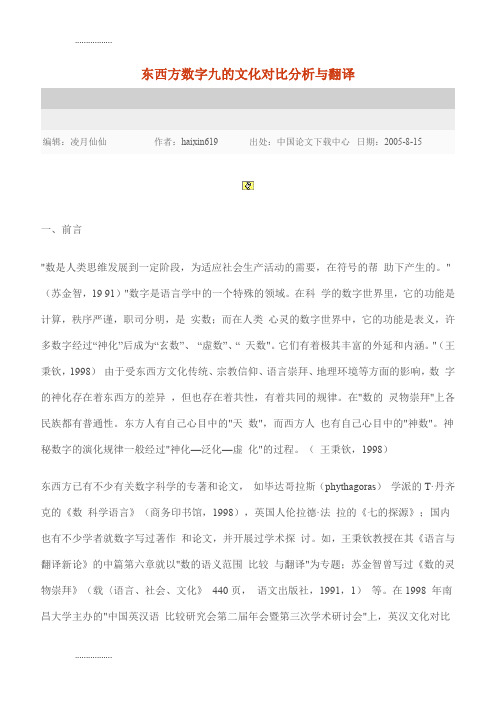
东西方数字九的文化对比分析与翻译编辑:凌月仙仙作者:haixin619 出处:中国论文下载中心日期:2005-8-15一、前言"数是人类思维发展到一定阶段,为适应社会生产活动的需要,在符号的帮助下产生的。
"(苏金智,19 91)"数字是语言学中的一个特殊的领域。
在科学的数字世界里,它的功能是计算,秩序严谨,职司分明,是实数;而在人类心灵的数字世界中,它的功能是表义,许多数字经过“神化”后成为“玄数”、“虚数”、“ 天数"。
它们有着极其丰富的外延和内涵。
"(王秉钦,1998)由于受东西方文化传统、宗教信仰、语言崇拜、地理环境等方面的影响,数字的神化存在着东西方的差异,但也存在着共性,有着共同的规律。
在"数的灵物崇拜"上各民族都有普通性。
东方人有自己心目中的"天数",而西方人也有自己心目中的"神数"。
神秘数字的演化规律一般经过"神化—泛化—虚化"的过程。
(王秉钦,1998)东西方已有不少有关数字科学的专著和论文,如毕达哥拉斯(phythagoras)学派的T·丹齐克的《数科学语言》(商务印书馆,1998),英国人伦拉德·法拉的《七的探源》;国内也有不少学者就数字写过著作和论文,并开展过学术探讨。
如,王秉钦教授在其《语言与翻译新论》的中篇第六章就以"数的语义范围比较与翻译"为专题;苏金智曾写过《数的灵物崇拜》(载〈语言、社会、文化》440页,语文出版社,1991,1)等。
在1998 年南昌大学主办的"中国英汉语比较研究会第二届年会暨第三次学术研讨会"上,英汉文化对比专业委员会会员曾就中南工业大学外语学院吴玲英老师的《中西文学中"以三为法”的文化模式》展开了激烈的讨论。
本人认为东方人,尤其是中国人,自己心目中的天数是"九"而不是"三",也并非完全是因为"九" 是"三"的倍数。
英汉语言中数字“九”的对比分析与翻译方法
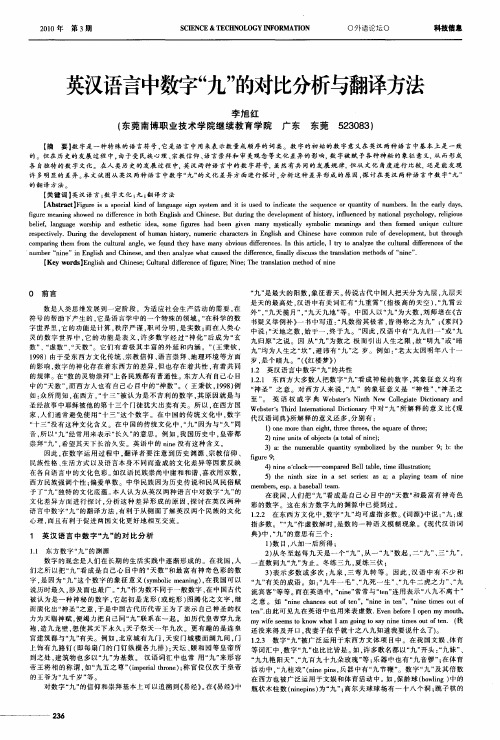
“ ” 最 大 的 阳数 。 征着 天 。 说 古代 中 国人 把 天分 为 九 层 的 最 高处 , 语 中有 关 词 汇 有 “ 重 霄 ” 指 极 高 的 天 空 ) “ 霄 云 汉 九 ( ,九 外 ” “ 天揽 月 ” “ 天九 地 ” 。 中 国人 以“ ” 大 数 , 师培 在 《 ,九 ,九 等 九 为 刘 古 符 号 的帮 助 下产 生 的 . 是语 言 学 中 的一 个 特 殊 的领 域 。 在 科 学 的数 书疑 义 举 例补 》 书 中写 道 :凡 数 指 其极 者 , 它 “ 一 “ 皆得 称 之 为 九 ”; 素 问》 《 字 世 界里 , 的 功能 是 计 算 , 序 严 谨 , 司分 明 , 实 数 ; 在 人类 心 它 秩 职 是 而 中说 :天 地之 数 . 于 一 , 于 九 。 ” “ 始 终 因此 , 语 中有 “ 九 归 一 ” “ 汉 九 或 九 灵 的数 字 世 界 中 . 的 功 能 是 表 义 。 多数 字 经 过 “ 化 ” 成 为 “ 它 许 神 后 玄 九归 原 ” 说 。因 从 “ ” 数 之 极 而 引 出人 生 之 限 , “ 之 九 为 故 明九 ” “ 或 暗 数” “ 数”“ 、虚 、天数 ” 。它 们 有 着极 其 丰 富 的外 延 和 内 涵 。 ” 王秉 钦 , ( 九 ” 为 人 生 之 “ ” 避 讳 有 “ ” 岁 。例 如 : 老 太 太 因 明 年八 十 一 均 坎 . 九 之 “ 19 )由于 受 东西 方 文 化 传 统 、 98 宗教 信仰 、 言 崇 拜 、 理 环 境 等方 面 语 地 岁 , 个 暗 九 。” 《 楼 梦》 是 (红 ) 的影 响 , 字 的 神化 存 在 着 东西 方 的 差 异 , 也 存 在 着 共 性 , 着共 同 数 但 有 1 英 汉语 言 中数 字 “ ” . 2 九 的共 性 的规 律 。在 “ 的灵 物 崇拜 ” 各 民族 都 有 普 通性 。东 方人 有 自己 心 目 数 上 1 . 东 西方 大 多 数 人 把数 字 “ ” 成 神秘 的数 字 , 象 征 意 义 均 有 .1 2 九 看 其 中的 “ 数 ” 而西 方 人 也有 自己心 目 中的 “ 数 ” (王 秉 钦 ,9 8 例 天 , 神 。 19 ) “ 圣 ”之 意 。对 西 方 人 来 说 ,九 ” 的象 征 意 义 是 “ 性 ” “ 圣 之 神 “ 神 、神 如 : 所 周知 , 西 方 , 十三 ” 认 为 是 不 吉 利 的数 字 , 原 因就 是 与 众 在 “ 被 其 至 ” 英 语 权 威 字 典 Wes V it e oeit Dcinr n 。 bt sNnh N w C l g e it ay ad e l a o 圣 经 故事 中耶稣 被 他 的 第 十 三个 门徒 犹 大 出卖 有 关 。 所 以 , 西方 国 在 We s r hr nent nlDc oay中 对 “ ” 解 释 的 意 义 比《 bt T i It a oa iinr es d r i t 九 所 现 家 , 们 通 常避 免 使 用 “ 人 十三 ” 个 数 字 。在 中 国 的传 统 文 化 中 , 字 这 数 代 汉 语 词 典 》 解 释 的 意 义还 多 , 别 有 : 所 分 “ 三” 十 没有 这 种 文化 含 义 。 在 中 国的 传 统文 化 中 ,九 ” 为 与 “ ” “ 因 久 同
中西方数字文化比较与翻译

“三”的文化对比分析
在汉语里,3被写成三,其意义是,上面一横代 表天,下面一横代表地,中间一横代表人,即融天、 地、人为一体,寓意天地人的关系。古人认为,数字 始于一,终于十,成于三。中国的道教有三清之说, 即玉清、太清、上清;佛教中有天、地、人三尊之说。 老子说:‚道生一,一生二,二生三,三生万物。‛ 可见三在中国文化中被赋予了很大的意义。所以,在 中国,三是一个很吉祥的数字。它有生长、吉祥之意, 如‚三羊开泰‛、‚岁寒三友‛、‚连种三元‛、 ‚吉祥三宝‛。
“八”的文化对比分析
在我国,南方经济发达区的粤语区的‚八‛与‚发‛谐音,广东人特别 喜欢数字八,以求生财之道,发财致富。现在对八的爱好已经风靡全国, 各行各业,男女老少对‚八‛可以说是特别偏爱,几乎达到迷信的程度。 电话号码喜欢有八,汽车牌照最好有八,有的商店取名‚518‛( ‚我 要发‛ 的谐音) 中国人把八个人坐的桌子叫‚八仙桌‛,功名显赫的人要坐‚八抬大 轿‛,以显‚八面威风‛,会办事的人总是 ‚八面玲珑‛,关系亲密 的朋友称为‚八拜之交‛。
“六”的文化对比分析
Six in English is an unpopular number, which is viewed as a sinister omen. For instance, at sixes and sevens(乱七八糟的; 糊涂的;迷茫的), hit sb. for six or knock sb. six(给敌人/某人以毁灭性的打击), six of the best(以藤鞭击六下——学校的一种 惩罚手段), six penny (不值钱), etc.
“五”的文化对比分析
在中国古代,‚五‛指金、木、水、火、土; 与此同时,‚五‛也与中国传统文化密切相关, 诸如五行、五福临门、五方保护神、五湖四海等 等。进一步说,用数字‚五‛代表东西南北中五 方,是中国一项非常悠久的文化传统。现在,北 京奥运吉祥物选择五个福娃,既可与奥运会标志 五环相呼应之外,又符合中国人口众多、历史悠 久、文化丰富的国情。
浅析中西方文化差异与英语翻译论文

浅析中西方文化差异与英语翻译论文无论是在学习还是在工作中,大家都经常接触到论文吧,通过论文写作可以培养我们独立思考和创新的能力。
相信很多朋友都对写论文感到非常苦恼吧,下面是店铺精心整理的浅析中西方文化差异与英语翻译论文,欢迎大家借鉴与参考,希望对大家有所帮助!浅析中西方文化差异与英语翻译论文篇1摘要:翻译的本质是两种文化的交流。
文化的差异是一个译者必须要处理好的问题,如果处理不当就容易让读者产生歧义。
分析了中西方主要的文化差异,并对主要的差异进行了举例说明。
介绍了对于这种差异的基本翻译方法,它们分别是:异化法、归化法和音译法。
并对这些方法进行了解释。
关键词:文化差异;处理方法;异化法;归化法;音译法1、语言是社会的产物,是人类历史和文化的结晶它凝聚着一个民族世代相传的社会意识,历史文化,风俗习惯等各方面人类社会所有的特征。
不同的文化需要沟通。
沟通离不开翻译,可见文化及其交流是翻译发生的本源,翻译是文化交流的产物。
翻译教学和研究的经验表明:翻译理论和技巧必须建立在不同语言和文化的对比分析的基础上。
翻译之所以困难,归根结底是语言差异和文化差异。
英汉两种语言在表达方式上有相似之处,但2012年02月13日09时09分,《英语学习:英语论文:简析中西方文化差异与英语翻译[1]》由出国英语编辑整理。
2、译法汉语文化中特有的事物在英语文化中完全空缺,这时可采用音译法将具有特殊文化内涵的词语“移植”到英语文化中去。
如:“功夫”kong fu、“乌龙茶”oolong等。
许多采用音译法翻译的词语已成为英语中的外来词,被西方大众广泛接受。
3、结语语言是文化的一部分,也是文化的传承者。
文化依靠语言进行传播、交流。
东西方文化的差异对英汉互译产生了深远的影响。
因此对于译者来说熟悉中英两种文化甚至比掌握这两种语言更为重要。
翻译离不开文化,没有基于文化的翻译是达不到交流的目的的。
本文只列举了三种基本的翻译方法,对于文化意象处理的问题,并没有统一的翻译方法和公式,译者应根据上下文灵活处理。
英汉数字文化差异及翻译

英汉数字文化差异及翻译社会生活中,科教文卫经济等方方面面都会涉及到数字,所以只要有人类居住的地方就有数字的出现,“认知是语言的基础,语言是认知的窗口”。
在各个民族的文化中,数字都绝不仅仅只有本身的计数计算功能,还是具有非数字意义的文化符号。
英汉民族的数字文化,产生于两种不同的文化和社会背景之中,存在差异是必然的。
因此我们要做的就是深入了解英汉数字文化之间的差异,这也有助于我们在不断发展进步的对外交流中做到相互尊重,减少误会与摩擦,更好的将中国文化推向世界。
一、中西方数字文化差异英汉两个民族英汉民族由于长久以来所处的不同地理位置,不同生活方式而形成各具特点的数字文化,因此,对数字的偏好、忌讳等存在许多异同。
在汉语中,人们最喜欢的数字就是“六”和“八”,“六六大顺”的寓意十分令人喜欢,此外,“八”因为谐音“发”也深受大家喜欢。
但有一个词语“二百五”,形容一个人鲁莽、没有头脑,所以常被用来骂人。
而西方世界主流信仰为基督教,基督教主张圣父、圣子、圣靈三位一体。
因此西方人偏爱“三”,把“三”看作吉祥的数字。
同时,因为耶稣死在“13”号这一天,所以西方人对13这个数字特别忌讳,甚至会直接避开这个数字。
二、翻译方法严复先生倡导的翻译三原则“信、达、雅”,傅雷先生也提出过的“重神似不重形似”,在翻译研究的进程中,虽然中西方翻译家们所研究的侧重点不同,但其实主要意思都是说:“译文要准确地表达原文的意义,保持原作的风格,忠实翻译原作的面貌”。
在面对数字的翻译时,我们也同样要采取各种适合的方式技巧,做到忠实,传神。
(一)直译每个民族的文化都有一定的共通之处。
英汉数字中有一些意义近似的词语,隐含意义基本相同,也就是说,在翻译这些相似性的表达时,我们一般选择保留数字进行直译。
例如:a drop in the ocean沧海一粟A fall into the pit,a gain in your wit.吃一堑,长一智A cat has nine lives.猫有九命(二)意译由于每个民族的数字具有都有其民族的独特表达和使用方法,因此我们进行翻译时,如过原样照搬,翻译出来的效果可能不会尽如人意,因此,有时须意译。
英汉数字中“9”的文化内涵及翻译

外国语学院毕业论文开题报告专业:学生姓名:班级:指导教师:开题日期: 2013年3月15日论文题目英文打印英汉数字中“9”的文化内涵及翻译一、本选题的目的和意义研究意义:认知语言学家普遍认为,人们对客观世界的感知、经验、对事物的认知模式影响人们对语言的使用,“认知是语言的基础,语言是认知的窗口”[1]P7。
综观人类文明的历史长河,最先发展起来的文化中包括语言文化,语言是人的认知能力不断发展的产物。
数字是语言文化中特殊的语言符号,数字概念的形成要比文字的出现早得多,它是人类思维发展到一定阶段以后,为了适应日趋发展的社会生产活动的需要,借助符号的帮助而产生。
语言是文化的载体,同时语言又反映社会文化,作为语言重要组成部分的数字短语,在各个民族的语言中积淀了丰富的文化内涵。
在各个民族的语言之间,尽管其数字短语的文化表现形式不尽相同,但是“在世界民族文化的百花园中它们交相辉映,光彩夺目,为五彩缤纷的人类文化增姿添色”,它们是各个民族语言文化的映射(mapping),承载着不同的文化内涵。
英汉两个民族由于受到民族文化、思维模式、社会习俗等方面的影响,对数字的偏好、忌讳等存在许多异同。
本文从缤纷复杂的含有数字的英汉习语中挑选“9(nine)”的文化内涵进行认知对比研究,从认知视角探讨英汉数字“9”文化的对等性与不对等性。
目的:数字是语言文化中特殊的语言符号,承载了丰富的文化内涵。
每个民族所都有其数字文化,在英汉两种语言中,数字的数学功能(数字意义)基本相同,但英汉两个民族不同的认知心理与认知模式使得两者的语言文化习惯存在差异,而且各自的数字文化具有鲜明的民族特色和象征意义。
该文从认知视角出发,通过比较探析英汉数字习语中 9 文化内涵的对等性与不对等性,并揭示其形成原因,以期更好地了解英汉两个民族的认知心理。
二、本选题相关领域研究的现状及基本情况罗云珍池玫在英汉数字文化内涵比较与翻译中对英汉数字的翻译方法进行了研究,他认为数字的基本用途是用来计算的, 但在东西方的民间语言和文学作品中有许多数字往往并不表示确切的数量, 而只是一个泛化的虚数, 这种数字语意的不确定性就是数字的语意模糊现象。
东西方数字九的文化对比分析与翻译
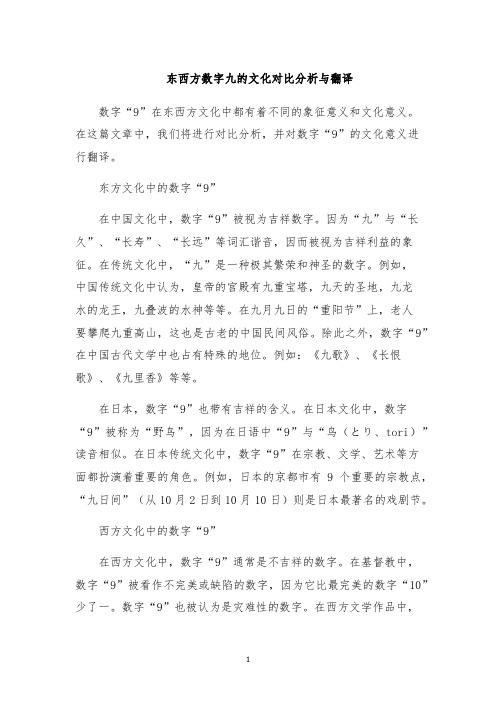
东西方数字九的文化对比分析与翻译数字“9”在东西方文化中都有着不同的象征意义和文化意义。
在这篇文章中,我们将进行对比分析,并对数字“9”的文化意义进行翻译。
东方文化中的数字“9”在中国文化中,数字“9”被视为吉祥数字。
因为“九”与“长久”、“长寿”、“长远”等词汇谐音,因而被视为吉祥利益的象征。
在传统文化中,“九”是一种极其繁荣和神圣的数字。
例如,中国传统文化中认为,皇帝的宫殿有九重宝塔,九天的圣地,九龙水的龙王,九叠波的水神等等。
在九月九日的“重阳节”上,老人要攀爬九重高山,这也是古老的中国民间风俗。
除此之外,数字“9”在中国古代文学中也占有特殊的地位。
例如:《九歌》、《长恨歌》、《九里香》等等。
在日本,数字“9”也带有吉祥的含义。
在日本文化中,数字“9”被称为“野鸟”,因为在日语中“9”与“鸟(とり、tori)”读音相似。
在日本传统文化中,数字“9”在宗教、文学、艺术等方面都扮演着重要的角色。
例如,日本的京都市有9个重要的宗教点,“九日间”(从10月2日到10月10日)则是日本最著名的戏剧节。
西方文化中的数字“9”在西方文化中,数字“9”通常是不吉祥的数字。
在基督教中,数字“9”被看作不完美或缺陷的数字,因为它比最完美的数字“10”少了一。
数字“9”也被认为是灾难性的数字。
在西方文学作品中,也体现出数字“9”带有凶险的感觉。
例如:《九条命》(Nine Lives)。
然而,在有些场合中,数字“9”也可以表示特殊的意义。
例如,在纪念日上,特别是纪念9/11袭击事件时,数字“9”被视为一个奇妙、强大、令人鼓舞的数字。
数字“9”的文化意义翻译数字“9”在不同的世界文化中,有着不同的文化意义和象征意义。
在东方文化中,“9”是一个具有神圣、吉祥的数字,代表着长久、长寿、繁荣。
在日本,数字“9”也被视为吉祥数字,常常与野鸟相联系。
而在西方文化中,数字“9”则比较不受欢迎,被视为不完美或是灾难性的数字。
数字“9”在文化中具有不同的含义,不同的文化背景赋予了它不同的象征意义。
关于数字九的英文作文初中

关于数字九的英文作文初中英文:As a middle school student, I find the number nine tobe quite fascinating. In mathematics, the number nine has some interesting properties. For example, when you multiply nine by any other number and then add the digits of the result together, the sum will always be nine. For instance, 9 x 5 = 45, and 4 + 5 = 9. This is known as the"multiplying by nine trick," and it never fails to amaze me.In addition to its mathematical properties, the number nine also holds cultural significance in many parts of the world. In Chinese culture, the number nine is considered lucky because it sounds like the word for "long-lasting" or "eternity" in Mandarin. This is why the number nine isoften associated with weddings and other celebrations in Chinese culture.Furthermore, in English, there are several idioms andexpressions that involve the number nine. For example, "dressed to the nines" means being dressed in a verystylish or fashionable way. I remember my friend Sarah always dresses to the nines for school dances, and she looks absolutely stunning every time.Another common expression is "the whole nine yards," which means giving something your all or going the extra mile. For example, when I was preparing for a big presentation, my teacher told me to go the whole nine yards and really impress the class with my research and creativity.Overall, the number nine is not just a mathematical concept, but it also holds cultural significance and is woven into our everyday language in various idioms and expressions.中文:作为一个初中生,我发现数字九相当有趣。
中西方文化中数字“九”的对比与翻译-文档资料
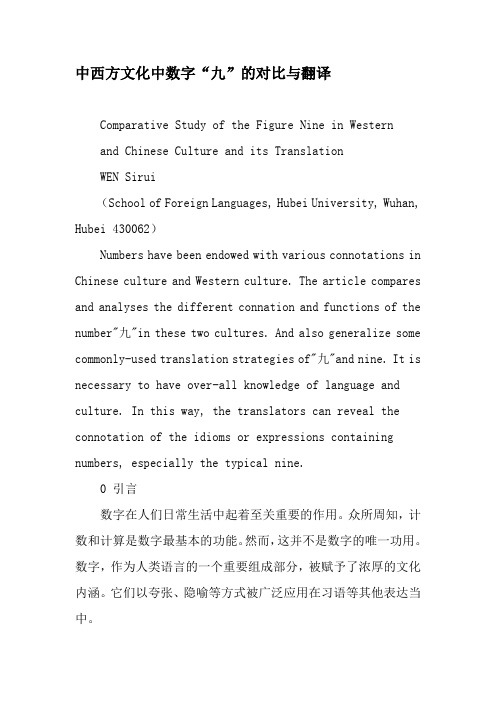
中西方文化中数字“九”的对比与翻译Comparative Study of the Figure Nine in Westernand Chinese Culture and its TranslationWEN Sirui(School of Foreign Languages, Hubei University, Wuhan, Hubei 430062)Numbers have been endowed with various connotations in Chinese culture and Western culture. The article compares and analyses the different connation and functions of the number"九"in these two cultures. And also generalize some commonly-used translation strategies of"九"and nine. It is necessary to have over-all knowledge of language and culture. In this way, the translators can reveal the connotation of the idioms or expressions containing numbers, especially the typical nine.0 引言数字在人们日常生活中起着至关重要的作用。
众所周知,计数和计算是数字最基本的功能。
然而,这并不是数字的唯一功用。
数字,作为人类语言的一个重要组成部分,被赋予了浓厚的文化内涵。
它们以夸张、隐喻等方式被广泛应用在习语等其他表达当中。
汉语和英语当中的数字“九”都深受东西方的不同文化,宗教,地理环境以及其它因素影响。
英汉数字的文化内涵差异

英汉数字的文化内涵差异:在古老的传统中,数字具有神圣的意义,还具有主吉凶的宗教迷信色彩。
不同的民族对数字的选择性和不同的偏爱,都有着深刻的民族文化的烙印。
下面就几组具有代表性的数字进行对比分析。
(一)、“三”与“九”1、“三”汉语中带“三”的习语有很多,如“三思而后行”、“垂涎三尺”、“三人行,必有我师焉”、“三句话不离本行”、“一日不见,如隔三秋”、“余音绕梁,三日不绝”、“三头六臂”、“三教九流”、“三令五申”等。
中国人对“三”的垂青是有因可循的。
“三”的本义就是代表天、地、人,即上为天,下为地,中为人。
在历史进程中,人们还逐渐认识到:时间有昔、今、未之分,空间有上、中、下之分,方位有左、中、右和前、中、后之分,似乎有三就能代表全部,“三”因此隐含完全、完美之意在内,并且积淀在中国人的潜意识中,从而人们在生活中不自觉地运用“三”来归纳事物,指导行动。
西方人认为世界由大地、海洋、天空三部分组成。
大自然包括动物、植物、矿物三方面内容;人体有肉体、心灵、精神三重性;基督教主张圣父、圣子、圣灵三位一体。
因此西方人偏爱“三”,把“三”看作完美的数字。
所以西方人常说The third time’the charm.(第三次准灵。
)Number three is always fortunate.(第三号一定运气好。
)莎士比亚戏剧里也说,All good things go by three.(一切好事以三为标准。
)。
2、“九”在中国人眼里,最富有神奇色彩的数字莫过于“九”了。
汉语中带“九”的习语,有如“九霄云外”、“九牛一毛”、“九死一生”、“九流宾客”、“九牛二虎之力”、“九天九地”、“一言九鼎”、“一龙生九子,九子各不同”等。
中国人对“九”的迷信源于对天的崇拜。
在变易之数中,全部奇数为阳数,偶数为阴数。
在卦符中,阳线或阳爻称为九,阴线或阴爻称为六。
因此,九成为所有阳数的典型代表,是阳的全息数符号。
九个九重叠,是极阳之数,代表极阳状况,表示极阳之象和极阳之理。
数字在中西方文化中的差异毕业论文
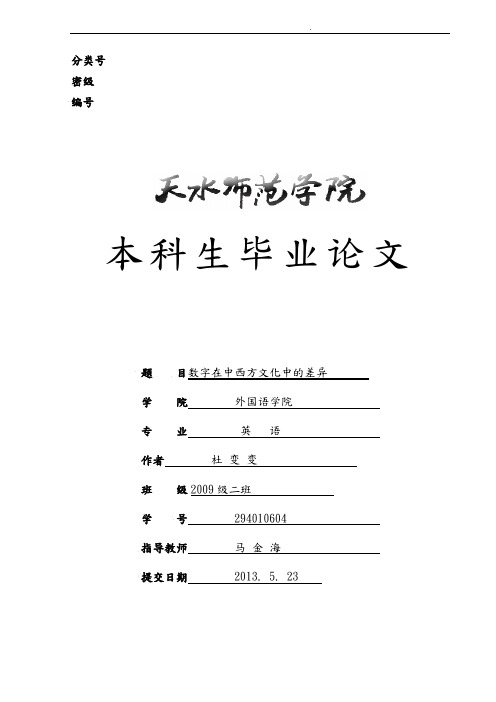
分类号密级编号本科生毕业论文题目数字在中西方文化中的差异学院外国语学院专业英语作者杜变变班级2009级二班学号 294010604指导教师马金海提交日期 2013. 5. 23The Cultural Differences of Numerals between China and WestCulturesDu BianbianA thesisSubmitted to the School of Foreign Languages and LiteratureTianshuiNormalUniversity in partial fulfillmentof therequirement for the degreeofBACHELOR OF ARTSinENGLISH LANGUAGETianshui, GansuMay,2013原创性声明本人重声明:本人所呈交的论文是在指导教师的指导下独立进行研究所取得的成果。
学位论文中凡是引用他人已经发表或未经发表的成果、数据、观点等均已明确注明出处。
除文中已经注明引用的容外,不包含任何其他个人或集体已经发表或撰写过的科研成果。
本声明的法律责任由本人承担。
论文作者签名:年月日论文指导教师签名:目录一、论文正文………………………………………………1—17二、附录1.毕业论文成绩评定表2.答辩小组意见3.答辩成绩评分表4.论文指导记录5.开题报告CONTENTSAbstract i摘要iiI.Introduction1II. The Analysis of Numerals Differences between China andWest Cultures (2)2.1 The Relationship between Numeral and Religion22.1.1 The Typical Numerals in Western Religion (3)2.1.2 The Typical Numerals in Chinese Religion42.2The Relationship between Numerals and National Psychology52.2.1 Numerals and Chinese Psychology (6)2.2.2 Numerals and Western Psychology (8)2.2.3 Typical Taboo Numerals in Chinese and Western (9)2.3The Relationship between Numerals and Language Aesthetics102.3.1 Numerals and Chinese Aesthetics (10)2.3.2 Numerals and English Aesthetics (12)III. The Cultural Differences of Numerals and Cross-Culture Communication14IV. Conclusion15References (17)Acknowledgements (iii)The Cultural Differences of Numbers between Chinese andEnglishDu Bianbian[Abstract]The human languages convey profound historical cultures and national features. And any language all over the world is rooted in a specific cultural background, reflecting the specific cultural contents. Numerals, being an extremely special language branch, have played crucial roles in the development of human society over thousand of years. Numerals and human life are closely related to each other. The function of numeralin human culture is not only limited in the count of mathematics, but also is a mysterious cultural symbol, which forms a unique numeral culture phenomenon. Numeral plays an important role in human cultural exchanges and development, reflecting the distinctive cultural characteristics. However, there are quite a few differences in religious beliefs, ethical psychology culture, and languages aesthetics in Chinese and westerners, so numerals have been given to the different cultural connotations in different cultural contexts, from the perspective of culture, this paper analyzes these factors to reduce misunderstandings in communication and promote the awareness of cross-cultural communication.Key Words: Numeral culture; Western culture and Chinese culture;Culture differences; Intercultural communication数字在中西方文化中的差异杜变变[摘要]人类的语言传达深厚的历史文化和民族特色。
- 1、下载文档前请自行甄别文档内容的完整性,平台不提供额外的编辑、内容补充、找答案等附加服务。
- 2、"仅部分预览"的文档,不可在线预览部分如存在完整性等问题,可反馈申请退款(可完整预览的文档不适用该条件!)。
- 3、如文档侵犯您的权益,请联系客服反馈,我们会尽快为您处理(人工客服工作时间:9:00-18:30)。
总之,在东西方文化中,数字"九"含有以下主要共性:
1)东西方大多数人把数字"九"看成神秘的数字, 其象征意义均有"神 圣"之意。
2)在东西方文化中,数字"九"均可虚指多数。
3)数字"九"被广泛运用于文体项目中。
数字“九”在东西方文化中的个性恐怕主要在于:对中国人来说,其神奇色 彩要比西方人更浓;其象征意 义的历史在东方文化中比西方文化中更悠久;其 涉及面在东方文化中比西方文化中更广泛。
其中收入与"九"有关词语和成语多达近二十条。常用的有:
a nine-day's wonder (an object or event that creates ashort-lived sensation)
____Those political expositions…that make a nine day'snine wonder till something fresh c omes alone——Mary Deasy. nine times out of ten(very often)
此外,《词源》中说:"九:虚指多数。""九"作虚数解时,是数的一种 语义模糊现象。《现代汉语词 典》中,"九"的意思有三个:(1)数目,八加一 后所得;(2)从冬至起每九天是一个"九",从一"九" 数起,二"九"、三 "九",一直数到九"九"为止。冬练三九,夏练三伏;(3)表示多数或多次: 九泉,三 弯九转等。因此, 汉语中有不少和"九"有关的成语。如:"九牛一 毛"、"九死一生"、"九牛二虎之力" 、"九流宾客"等等。
be dressed up to the nines(elaborately dressed, as for aformal occasion)
____She dressed herself up to the nines and went to theparty.
in the nineholes:in the difficult situation nine-men's morris: morris played with nine counters A cat has nine lives: A cat can move so fast and jump sowell that he seems to escape being killed many times.
东西方已有不少有关数字科学的专著和论文, 如毕达哥拉斯(phythagoras) 学派的T·丹齐克的《数 科学语言》(商务印书馆,1998),英国人伦拉德·法 拉的《七的探源》;国内也有不少学者就数字写过著作 和论文,并开展过学术探 讨。如,王秉钦教授在其《语言与翻译新论》的中篇第六章就以"数的语义范围 比较 与翻译"为专题;苏金智曾写过《数的灵物崇拜》(载〈语言、社会、文化》 440页, 语文出版社,1991,1) 等。在1998 年南昌大学主办的"中国英汉语 比较研究会第二届年会暨第三次学术研讨会"上,英汉文化对比专 业委员会会 员曾就中南工业大学外语学院吴玲英老师的《中西文学中"以三为法”的文化模 式》展开了激烈的 讨论。本人认为东方人,尤其是中国人,自己心目中的天数 是"九"而不是"三",也并非完全是因为"九" 是"三"的倍数。
中国人以"九"为大数,刘师培在《古书疑义举例补》一书中写道:"凡数 指其极者,皆得称之为'九' ;"《素问》中说:"天地之数,始于一,终于 九。"因此,汉语中有"九九归一"或"九九归原"之说。因 从"九"为数之 极而引出人生之限,故"明九"或"暗九"均为人生之"坎",避讳有“九”之 岁。例如:“ 老太太因明年八十一岁,是个暗九。"(《红楼梦》)。日本人一般 认为"九"是"苦命和痛苦"的象征,因 为"九"与"苦"同音,因此忌讳 "九"。然而,《外语与外语教学》曾报道过国内一位学者曾为考证这一点 ,采 用"全选法"将日本某地电话号码其中的几千个姓和名分别进行统计,结果发现 将"九"作为姓的只占极 少数(约占0.35%),而将"九"作为名的却不少(约 占35%)。看来,日本人忌讳"九"也并非绝对。
三、数字"九"的翻译问题
罗马西塞罗说过:"翻译不是字当句对,而是保留语言的总风格和力 量。""按分量而不是按数量译词" 。此处所说的数字是指经过神化、泛化、 虚化了的"虚数","实数"的翻译不在此例。根据这一理论,结合 东西方文 化的共性与个性,可采用如下的翻译方法,并遵循以数字"九"及其倍数在西方也被广泛运 用于文娱和体育活动中。如, 保龄球(bowling )中的瓶状木柱数(ninepins) 为"九";高尔夫球球场有一十八个洞:跳子棋的棋板上各 方均为九个孔; 古 时英国还有一种九个男人一起跳的舞蹈(morrisdance)等。由此看来,数字"九" 也倍 受西方人的青睐。
在我国,数字"九"涉及面在所有数字中最广。含有数字"九"的词汇也十 分丰富。如,"九州"是指传 说中的我国上古行政区划,后用作"中国"的代 称。因此,有的全国性的电视节目就取名为“九州方圆”;“ 九族"(the nine degrees of kindred: either thenine generations from one's great-great-gr andfather down toone's great-great-grandson;or four generations of one'spatemal relations, three generations of one's matemalrelations, and two generations of noe's wife's relatio ns),古代有一种残酷的刑法叫"诛灭九族";古代传说 "龙生九子,各有所好"。因此,《红楼梦》第九回 中用"一龙生九种,种种各 别"来比喻贾氏家族族大人多,龙蛇混杂,好坏不一,各种各样的人都有。还有 " 九龙杯"等。此外,在文娱、体育等词汇中,数字"九"也比比皆是。如, 许多歌名都以"九"开头:"九妹 "、"九九艳阳天"、"九百九十九朵玫瑰" 等;乐器中也有"九音锣";在体育活动中,"九柱戏"(nine pins),兵器中 有"九节鞭"[但这与西方文化中的"九尾鞭”(cat-o '-nine- tails: an instrurnent of punishment so calledfrom the nine pieces of leather or cord which compose it)意义不大一样]。 地名中也有一些以"九"开头的,如"九 寨沟"、"九华山"、"九江"和"九龙"等。此外,中国人常把" 九"看成 为吉祥数字之一。在申请电话号码时,人们宁愿多出
二、东西方数字"九"的文化对比分析
在我国,人们之所以把"九"看成是自己心目中的"天数"和最富有神奇色 彩的数字, 是因为"九" 这个数字的象征意义(symbolicmeaning),在我国可 以说历时最久,涉及面也最广。 "九"作为数不同于一 般数字,在中国古代被 认为是一种神秘的数字,它起初是龙形(或蛇形)图腾化之文字,继而演化出"神 圣" 之意,于是中国古代历代帝王为了表示自己神圣的权力为天赐神赋,便竭 力把自己同“九”联系在一起。如天 分九层,极言其高,天证/诞日为正月初 九,天子祭天一年九次。更有趣的是连皇宫建筑都与"九"有关。例 如,北京 城有九门,天安门城楼面阔九问,门上饰有九路钉(即每扇门的门钉纵横各九排)。 汉语词汇中也常 用"九"来形容帝王将相的称谓,如"九五之尊"(imperial throne);称官位仅次于皇帝的王爷为"九千岁 "等。
根据阴阳五行与数的关系,万物之根均为数,宇宙也是数。数始于1而终于 10,五行也是数,按传统的五行 理论来划分,则1、2为木:1为阳木,2为阴 木。以3、4为火:3为阳火,4为阴火。以5、6为土:5为阳土,6为 阴土。 以7、8为金:7为阳金,8为阴金。以9、10为水:9 为阳水,10为阴水。这 就是将"象"、"数"与五行 结合起来推演变化,用以显示事物发展变化的内 在联系。由此看来,"九"是最大的阳数,象征着天。传说古 代中国人把天分 为九层,九层天是天的最高处,汉语中有关词汇有"九重霄"(指极高的天空, "九霄云外" ,"九天揽月","九天九地"等。另外,天坛,这个明清两代 祭天的场所,其建筑无处不体现着“九”的象 征意义。 民间传说中还有"九头 鸟"(nine-headed bird: a fabulous bird whose appearance was f ormerlyregarded as a bad omcn)的故事。
